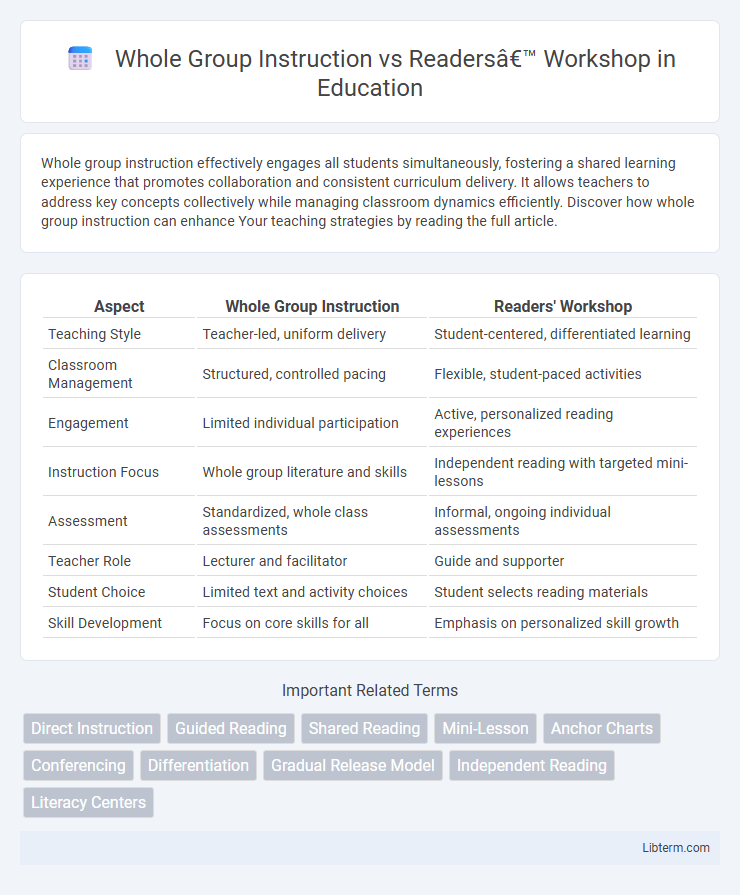Whole group instruction effectively engages all students simultaneously, fostering a shared learning experience that promotes collaboration and consistent curriculum delivery. It allows teachers to address key concepts collectively while managing classroom dynamics efficiently. Discover how whole group instruction can enhance Your teaching strategies by reading the full article.
Table of Comparison
| Aspect | Whole Group Instruction | Readers' Workshop |
|---|---|---|
| Teaching Style | Teacher-led, uniform delivery | Student-centered, differentiated learning |
| Classroom Management | Structured, controlled pacing | Flexible, student-paced activities |
| Engagement | Limited individual participation | Active, personalized reading experiences |
| Instruction Focus | Whole group literature and skills | Independent reading with targeted mini-lessons |
| Assessment | Standardized, whole class assessments | Informal, ongoing individual assessments |
| Teacher Role | Lecturer and facilitator | Guide and supporter |
| Student Choice | Limited text and activity choices | Student selects reading materials |
| Skill Development | Focus on core skills for all | Emphasis on personalized skill growth |
Introduction to Whole Group Instruction and Readers’ Workshop
Whole Group Instruction involves delivering consistent lessons to all students at once, promoting uniform content coverage and teacher-led guidance. Readers' Workshop emphasizes individualized learning through small group or independent reading activities, fostering student engagement and differentiated instruction. Comparing both methods highlights differences in instructional structure, student interaction, and assessment approaches.
Key Principles of Whole Group Instruction
Whole Group Instruction centers on delivering a uniform lesson to all students simultaneously, emphasizing shared learning objectives and collective engagement. Key principles include structured pacing, direct teacher modeling, and consistent use of explicit teaching strategies to build foundational skills across diverse learners. This approach facilitates efficient content delivery and allows for immediate feedback, fostering a cohesive classroom environment.
Essential Components of Readers’ Workshop
Readers' Workshop centers on essential components such as mini-lessons targeting specific reading strategies, guided reading sessions tailored to individual student needs, and independent reading time to build fluency and comprehension. Whole Group Instruction often lacks this differentiation, as it delivers uniform content to all students simultaneously without addressing diverse reading levels. The Readers' Workshop model enhances student engagement and skill development through personalized feedback and collaborative discussions, fostering deeper literacy growth.
Benefits of Whole Group Instruction in Literacy
Whole Group Instruction fosters consistent exposure to essential literacy skills, enabling teachers to model reading strategies and provide immediate, collective feedback, which accelerates skill acquisition. This approach promotes a shared learning experience that builds a strong classroom community and encourages active participation through guided discussions and collaborative analysis of texts. Whole Group Instruction also supports differentiation by allowing targeted interventions and scaffolded instruction that address diverse student needs within a unified lesson framework.
Advantages of Readers’ Workshop for Student Engagement
Readers' Workshop fosters personalized learning by allowing students to engage with texts at their own reading levels and interests, which boosts motivation and participation. This model encourages active discussion and peer collaboration, enhancing comprehension through interactive dialogue. Small group instruction within Readers' Workshop provides targeted support, ensuring diverse learners remain engaged and challenged.
Comparing Instructional Strategies: Whole Group vs Readers’ Workshop
Whole Group Instruction emphasizes direct teaching with all students receiving the same content simultaneously, fostering uniformity in learning objectives. Readers' Workshop incorporates differentiated instruction through individualized reading selections and targeted mini-lessons, supporting diverse learner needs and promoting independent reading skills. The choice between strategies depends on classroom goals, with Whole Group Instruction benefiting skill introduction and Readers' Workshop enhancing personalized literacy development.
Addressing Differentiation in Both Approaches
Whole Group Instruction provides a structured framework where differentiation is often achieved through tiered questioning and scaffolding to meet diverse student needs. Readers' Workshop emphasizes personalized learning, allowing teachers to tailor mini-lessons, guided reading groups, and independent reading to individual skill levels and interests. Both approaches require strategic assessment and flexible grouping to effectively support differentiated instruction and maximize student engagement.
Assessing Student Progress: Methods and Outcomes
Whole Group Instruction relies heavily on standardized assessments and whole-class observations to measure student progress, providing broad data useful for identifying general trends. Readers' Workshop emphasizes formative assessments, such as individual reading conferences and tailored running records, enabling teachers to customize instruction based on a student's unique literacy development. Outcomes in Readers' Workshop often reveal more nuanced growth in reading comprehension and fluency, while Whole Group instruction offers consistent benchmarks but may overlook individual student needs.
Integrating Whole Group and Readers’ Workshop for Balanced Literacy
Integrating Whole Group Instruction and Readers' Workshop fosters balanced literacy by combining explicit teaching of foundational skills with individualized reading practice, enhancing student engagement and comprehension. This blended approach utilizes targeted mini-lessons during whole group sessions to build common skills, followed by personalized reading workshops where students apply strategies at their own pace. Utilizing data-driven instruction ensures differentiation, supporting diverse learners and promoting consistent literacy growth across the classroom.
Choosing the Best Approach for Your Classroom
Whole Group Instruction offers structured, teacher-led lessons ideal for delivering consistent content but may limit individual student engagement. Readers' Workshop emphasizes student choice and differentiated reading practice, fostering autonomy and tailored support for diverse reading levels. Evaluating classroom size, student needs, and instructional goals helps determine the best approach to promote literacy development effectively.
Whole Group Instruction Infographic

 libterm.com
libterm.com